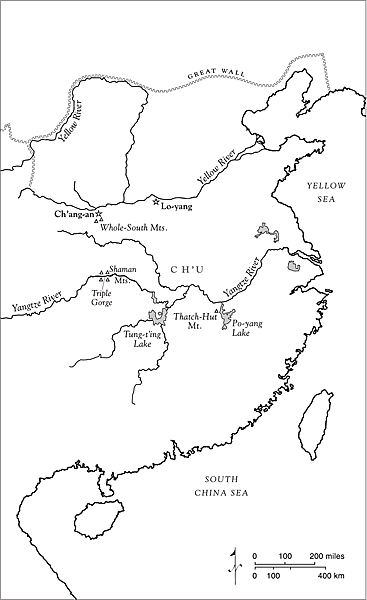
T’ANG DYNASTY II: EXPERIMENTAL ALTERNATIVES
(c. 800 to 875)

THE CIVIL WAR launched in 755 by An Lu-shan created widespread social chaos and chronic militarism that haunted China until the T’ang Dynasty finally fell a century and a half later, in 906, replaced by the Sung Dynasty. This situation inspired a new and quite different kind of poetry. The transition was prefigured in the dark work of late Tu Fu and the enigmatic poems of Wei Ying-wu, and then began in earnest with the work of Meng Chiao. Although major poetry continued to be written in the mainstream (most notably by Po Chü-i, probably the greatest poet of this period), Meng Chiao initiated an alternative tradition of experimental poetry that made the late T’ang years a period that opened a whole new range of poetic diversity.
Traditionally, Chinese poets rendered immediate experience and their responses to it, but the late T’ang experimentalists reversed that equation: their focus was on imagining poems and, in so doing, creating new experience. The essence of this poetry is the attempt to create worlds of imagination and intense interiority, and it employed strikingly modern techniques to achieve these effects: surrealism, symbolism, collage, nonlogical juxtapositions and imagistic fragmentation, hermetic ambiguity. That this approach, so dominant and taken for granted in the modern West, would be considered experimental is eloquent testimony to the fierce bond that connected Chinese poets to the landscape of empirical reality.
From the perspective of the modern West, where similar experimental strategies have largely defined innovation for over a century, it is interesting to consider how short-lived this alternative tradition was. In creating the poetic revival that made their dynasty the second great age of Chinese poetry, Sung poets saw in this experimental poetry a kind of decadence, a withdrawal from the social chaos ravaging the country into dreamy private realms. While their often bleak and disorienting strategies are no doubt the artistic embodiment of the chaotic social situation, the Sung poets felt this poetry was merely expressing that chaos, rather than standing against it, with a voice of clear-eyed empiricism, social responsibility, and spiritual insight. Still, those Sung critics admired the imaginative virtuosity of the late T’ang experimentalists and the new psychological depths their work opened.